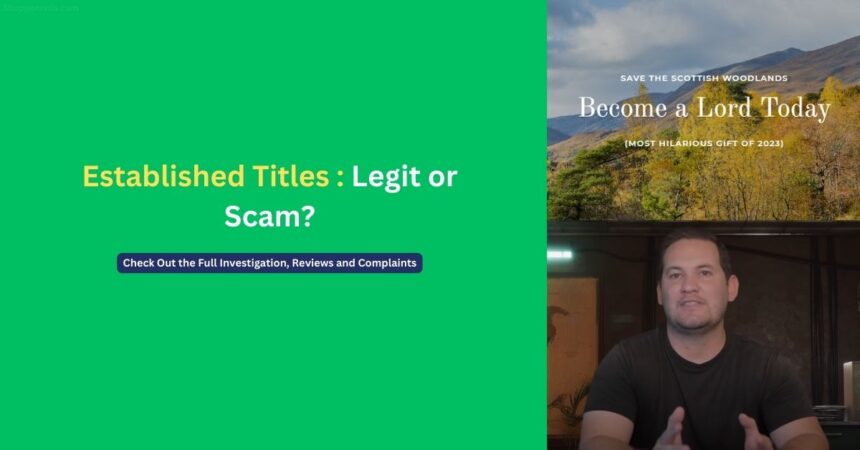A recent viral video has raised questions around Scottish nobility title company Established Titles and their claimed conservation efforts tied to selling small land plots. The accusations highlight issues of deceitful influencer marketing and lack of sponsor vetting.
This article reviews the key details around the purported forest conservation program, allegations of a “Lordship scam”, and debate among prominent YouTube creators.
Overview of Established Titles and Business Model
Established Titles sells “Souvenir Plot Lordship Packages” starting at $49.95 that supposedly come with a tiny section of land in Scotland, along with digital certificates conferring nobility titles like Laird, Lord or Lady.
The company claims to have multiple conservation partnerships where they allocate funds from each land plot sale to help preserve and reforest estates across Scotland. Their website and sponsorships market this mission of saving Scottish woodlands as a prime feature of purchasing.
However, the tiny land plots themselves are not actually owned by customers and carry no legal property rights or ability to build on them. They cannot be registered as owned parcels under Scottish law. The titles similarly have no legal standing in Scotland.
So in effect, purchasers receive only a symbolic plot location and printable nobility certificate. This has raised debate on whether the land and conservation ties are deceptive marketing more than real substance behind each order.
YouTuber Scott Shafer’s Viral Criticism Video
On December 5th, 2022, American YouTuber Scott Shafer published a video titled “I Bought a Square Foot of Land in Scotland and Became a Lord” which exposed Established Titles as an apparent “Lordship scam” preying on sponsors and customers.
The video detailed how Established Titles does not actually convey land ownership or nobility rights despite misleading marketing language regarding saving Scottish forests. Shafer revealed the company is also connected to a dubious Hong Kong-based venture capital firm behind shady online brands.
The criticism went viral across YouTube and social media, garnering over 2 million views quickly. This raised instant scrutiny around Established Titles’ business practices and conservation claims.
Breaking Down Established Titles’ Conservation Claims
A core sales pitch by Established Titles is that buying their land plots helps preserve Scottish woodlands. Their website and sponsorships highlight partnerships with various conservation groups and tree-planting programs.
However, the YouTuber Scott Shafer contends these conservation ties are illusory and that Established Titles pockets the profits rather than using them for environmental good as claimed.
Does Established Titles really plant trees?
According their website, Established Titles promises to plant one tree in Scotland for each order through partnerships with non-profit Trees for the Future and woodland conservation group Woodland Trust.
Yet Shafer argues that instead of directly planting trees, the company only provides a tinny amount $1 donation to a charity that plants trees – regardless of total orders. Customers could more effectively give themselves.
Is the land being actively conserved?
Shafer also revealed that the land used by Established Titles is already designated as protected areas that Scottish authorities keep in a natural state. So the tiny individual plots sold make no incremental difference to conservation aims.
This further supports allegations that ecological preservation is more a deceptive gimmick for Established Titles to market meaningless nobility titles rather than an impactful model for funding conservation itself.
Creator Community Response and Company Reaction
The viral exposure of Established Titles as an apparent scam created an immediate ripple effect across sponsored YouTube creators and a defensive public response from the company.
How are prominent YouTubers responding?
By December 9th, major creators like Philip DeFranco, TheQuartering, and Nerd City had all apologized and ended sponsorship deals with Established Titles in light of criticism. Others like Paige Christie gave the brand tentative support but asked for clarification.
However, some creators like Josh Strife Hayes and Raleigh Lilith fully stood by Established Titles – arguing claims were overblown or misleading. This created debate within the community.
What is Established Titles’ response to allegations of Scam?
In a December 6th YouTube video, the CEO of Established Titles directly responded – claiming Shafer’s video was highly defamatory and legally actionable.
While not providing evidence to debunk specific claims around questionable conservation tactics and ownership rights, the CEO reiterated their products are marketed transparently as “fun gifts” not legitimate land purchases. He accused Shafer of misrepresenting their business to spark outrage.
The company maintains that plot locations are assigned within protected Scottish estates and that they contribute to woodland preservation efforts. Though specifics remain disputed and unclear.
Evaluating Customer Complaints and Reviews
As part of the viral backlash against Established Titles, more light has also been shed on numerous customer complaints and negative reviews predating the recent video expose.
An analysis finds consistent issues raised around misleading marketing practices and failure to deliver on promised products or refunds. This further brings the company’s business integrity into question.
Misleading Sales Tactics
Many reviews accuse overly pushy sales people for Established Titles of making false claims around land ownership rights and conservation planting in order to pressure buyers.
Essentially selling meaningless nobility certificates for profit under the guise of environmentalism. These contribute to perceptions of the company scamming rather than transparency.
Failure to Fulfill Orders
Additionally, several disgruntled customers report never receiving land certificates/plot information as promised. Reviewers claim unresponsive customer service when seeking resolution, with refunds often still not provided.
This suggests not only questionable sales tactics but also issues of reliability and accountability around actually providing paid products.
How to Identify “No Product” Scams
“No Product Scam” is refers to companies that aggressively sell associated physical/digital products online while the core offering itself is relatively meaningless or worthless.
Often such companies deceive consumers around legal rights, value propositions, or other product aspects while pocketing profits and providing little tangible in return. This frequently manifests around digital services, memberships programs or symbolic physical items.
When identifying potential “no product” frauds, warning signs include:
- Aggressive/deceptive marketing for relatively useless core product
- Lack of customer support post-purchase
- Excessive upselling of higher tiers or upgrades
- Vague language around legal rights or other offerings
- Ties to lower reputation industries like MLMs or high-risk crypto projects
Frequently Asked Questions
1. Does buying a land plot mean you legally own land in Scotland?
No. The tiny size means it cannot be officially registered as land ownership. Plots are considered “souvenir” or novelty items.
2. Can I build, farm, or live on my land plot?
No. Purchasers only receive a defined location, they have no rights to physically access, alter or utilize the land plot area.
3. Will I get legal documentation of Scottish nobility status?
No. While novelty certificates are provided, there are no legal Scottish titles or rights conferred purely by land ownership in modern law.
4. What are my refund rights if unsatisfied?
Established Titles offers refunds within 60 days of purchase if the product remains unused/undamaged, under its standard return policy terms.
The Bottom Line
In summary, while Established Titles claims to sell land and nobility titles to help fund conservation of Scottish woodlands, accumulating evidence indicates this is largely deception to push meaningless products using influencer marketing and misleading environmental messaging.
Specific accusations of failure to transparently plant trees, conservation irrelevant protected land, no legal land rights, fake nobility claims, and more seem reasonably well-founded upon further analysis.
Coupled with mounting complaints around refusal to issue refunds and lack of customer support, Established Titles exhibits multiple warning signs of an unethical no product scam rather than a mission-driven conservation business.
Some Key Highlights after the investigation:
- Land plots carry no ownership rights, building permissions, etc.
- Nobility title claims are not officially recognized under Scottish law
- Conservation ties are vague and questioned by critics
- Customers report issues obtaining refunds or support
- Youtuber Scott Shafer Strongly blamed it a “no product chinese” scheme that pockets profits
So prospective buyers should research carefully and manage expectations around what they actually receive in return. While cheaper novelty deeds with no questionable sponsorship claims may hold similar value for lighthearted gifts around Scottish ancestral ties or forestry, Established Titles in particular faces growing scrutiny.









































